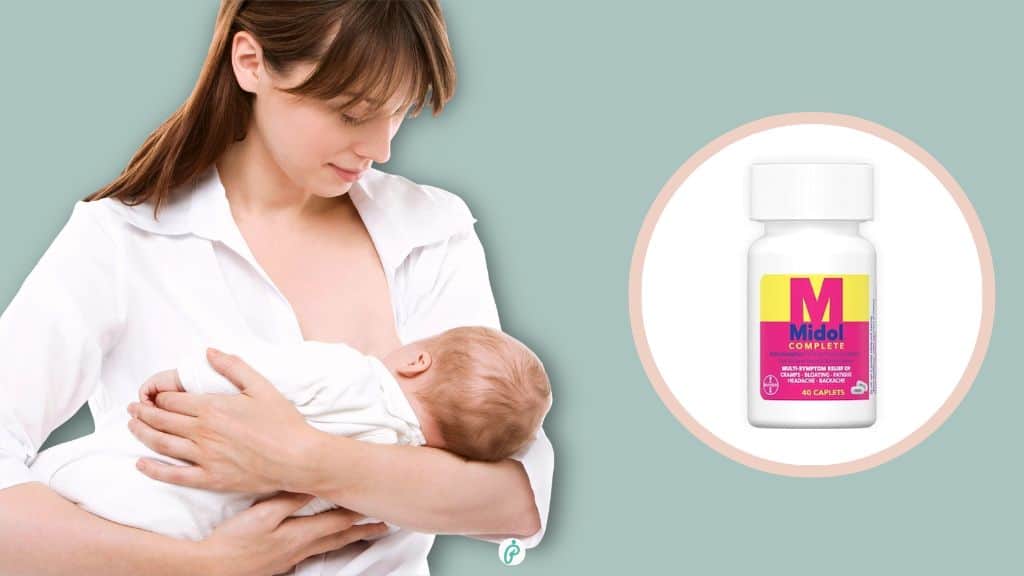
Table of Contents
Period pains could easily be the most frustrating and intense discomfort a menstruating woman can experience. Irrespective of Aunt Flo’s visits being regular or irregular, the pains and aches caused can be dreadful. And while you won’t menstruate during pregnancy, your period will return once you give birth (during your postpartum recovery).
It might be tempting to turn to the same pain relief medications that you used before your pregnancy, but have you thought about the outcomes of it when breastfeeding? Your newborn may get the medications through breastmilk so it is important to be cautious of what you are putting into your body.
To help you, we’ve taken it upon ourselves to step in. Through this blog, we take a look at one such painkiller and its possible side effects or benefits while breastfeeding – Midol. It might just be one of the capsules in your medicine bag that you used to pop in whenever those awful cramps hurt but now since you have a little human depending on you for their food, you must have wondered if it’s safe to intake. Can you take Midol while breastfeeding? Do they cause any side effects? Is Midol safe to take while breastfeeding? Read on to know what the experts say!
What is Midol?
Before we answer the question of if you can take Midol while breastfeeding, you must know what this medication is. Midol is an over-the-counter medication designed to relieve menstrual pain among others. Its common usage is to relieve bloating and cramps during a menstrual cycle but there are different types of Midol with different purposes.
Typically, Midol Complete Caffeine Free and Midol Complete are used for discomfort and period pain. Midol Bloat Relief helps in water weight gain and bloating whereas Midol Long-lasting Relief alleviates muscle aches (up to 8 hours).
Midol Complete has 3 ingredients in it:
- Acetaminophen (relieves pain)
- Pyrilamine maleate (works as an antihistamine)
- Caffeine (works as a diuretic to cure bloating)
Pyrilamine maleate is a common cold medicine that causes drowsiness but Midol uses it to ease bloating.
Can You Take Midol While Breastfeeding: Effects of Acetaminophen on Breastfed Infants
Acetaminophen is the best analgesic for fever reduction in nursing mamas as it shows very little in breast milk (less than 0.5 mg/L for 650 mg of acetaminophen) with some rare adverse effects. Here are some of the reported side effects of acetaminophen in breastfed infants:
- A maculopapular rash on the face and upper trunk of a 2-month-old baby (it subsided when the drug was stopped and reappeared with another dose)
- Wheezing and asthma
Can You Take Midol While Breastfeeding: Effects of Caffeine on Breastfed Infants
Taking caffeine while breastfeeding has been shown to cause poor sleep patterns, jitteriness, and fussiness in breastfed infants if it exceeded the normal dose of 300 to 500 mg. Here are some reports of adverse effects of caffeine in breastfed infants when the does were high
- Jitteriness in a 6-week-old baby whose mother had 4 to 5 cups of coffee
- Irritability and restlessness in a 5-month-old baby whose mum has 20 cups of coffee a day
- Irregular sleep patterns, being jumpy and fretful babies whose mother drank 1 can of cola, 4 mugs of tea, and 5 mugs of coffee daily
Can You Take Midol While Breastfeeding: Effects of Pyrilamine on Breastfed Infants
Pyrilamine is a first-generation antihistamine also known as Mepyramine. Larger doses of pyrilamine may decrease milk supply or cause effects on breastfed infants. It is highly risky when it is combined with any sympathomimetics. No relevant information on pyrilamine has been found as of date. Adverse effects of antihistamines include a decrease in prolactin in early postpartum women but further research is awaited.
Is Midol Safe While Breastfeeding?
Breastfeeding women won’t get their periods right after childbirth but they may have period-like symptoms such as bloating and cramping. At such times it is okay to take Mido in small doses, say the experts. However, it is always best to check in with your healthcare provider before taking any type of medicine (even if they are over-the-counter ones).
Breastfeeding mums have different menstruation than non-lactating women. It is normal for them to feel a delay in their periods (it could be a year to a few months). It is caused due to higher levels of prolactin in their bodies which means you won’t release eggs or ovulate. Here’s some data on menstruation after childbirth; menstruation was reestablished in
- 25.7% of lactating women at 6 to 12 weeks
- 20% of lactating women at 12 to 18 weeks
- 14.3% of lactating women at 18 to 24 weeks
- 35.5% of partly-lactating women within 6 weeks
- 51.3% of partly lactating women at 6 to 12 weeks
As with any drug, there’s sure to be a common allergic reaction that can manifest as a rash or hives and swelling. If you experience any kind of reaction after taking Midol, stop consuming it immediately and consult your doctor. Other common but lesser adverse effects could be
- Stomach ache
- Constipation
- Drowsiness
Midol While Breastfeeding: Safety Measures
Ready to take Midol while breastfeeding your baby? Keep in mind these precautions so that none comes to harm:
- Don’t take more than 6 pills in 24 hours
- Keep a lookout for any symptoms or side effects on yourself and your baby
- Immediately stop taking the pills if any side effects are found
- Consult a doctor
There isn’t enough data surrounding the safety of caffeine consumption by breastfeeding mums even though some do assert that it does not transfer to breast milk outright. Prolonged intake of antihistamines like pyrilamine can affect milk supply even if it doesn’t transfer to your milk.
For breastfeeding and lactating mums, it’s better to first try some natural cramp-relieving methods and remedies like
- Eating calcium
- Higher fiber intake
- Light exercise
- Drinking plenty of water
Calcium-rich supplements and foods prevent the muscles from cramping. Ideally, you should consume 1000 mg of calcium every day. Here are some excellent sources of calcium
- Tofu
- Sesame seeds
- Almonds
- Figs
- Kale
- Soybeans
- Spinach
- Sunflower seeds
- Dairy products
The Bottom Line: Can I Take Midol While Breastfeeding?
Midol contains caffeine, pyrilamine, and acetaminophen. The effects of each of these ingredients have been discussed and documented above. Any higher dose can cause side effects in your baby or you so remember to keep it within the recommended limit. As long as you do it’s okay to take Midol while breastfeeding but it’s best to always know what your healthcare provider thinks. They will be able to make the best recommendation for you based on your pregnancy journey and postpartum recovery.
Can You Take Midol While Breastfeeding FAQs
1) Is it safe to take Midol while breastfeeding?
2) How many Midol can I take for cramps?
3) Is Midol just ibuprofen?
4) How is Midol different from Tylenol?
5) Why does Midol work so well?
6) Does Midol help sore breasts?
7) What can you take for period cramps while breastfeeding?
8) What medications should not be taken while breastfeeding?
9) What are the side effects of Midol?
Sources:
Reviewed By:

Leslie Owens - RN IBCLC, Lactation Coach & Consultant
Leslie Owens is a Perinatal RN and IBCLC based in the Atlanta area. She prides herself as a human milk advocate, facilitator, and clinician. She has supported pregnant and postpartum families for over 10 years in the perinatal space. Her passion for birth and lactation began with her own personal experiences, birthing and breastfeeding three children, including twins.
Leslie currently owns and operates Mother Nurture Maternity, a private practice where she provides breastfeeding education and support, as well as coaching and mentorship to aspiring and new IBCLCs, She is committed to providing accessible, skilled, compassionate, and equitable care to all.









